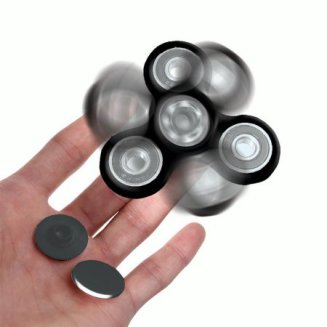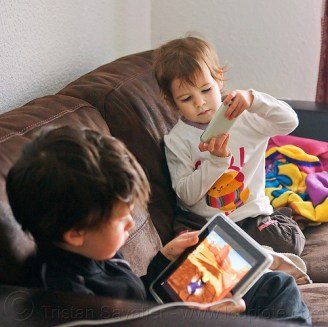Fidget Spinners vs Technological Devices
Yesterday afternoon, as my dad toyed with my sister’s fidget spinner, he commented, “I’d much rather have my child playing with their fidget spinner all day than staring at a phone all day.” He then talked about how so many kids today spend about 8 hours a day on a phone or tablet. They magnetize to any kind of device, and according to my dad, it is causing brain damage to children, especially young children, and is negatively affecting their social and communication skills. This prompted me to do a little bit of research.
Are technological devices really causing more harm than benefits? It is definitely true that children are basically addicted to their technological devices, more so than even their TV. When I go to the store, I will often see toddlers in shopping carts playing on their mom’s iPhone or Android. All you have to do is to pull out your phone, and a little kid will come running to see it. Try taking the device away from them, and you might start World War III.
One reason tablets/phones are so appealing to young children is that they are stimulated by whatever they are playing on. If it’s a game and they accomplish something, they are happy, and the “Do it again!” phrase goes off in their mind. However, this is also creating a compulsive behavior. Additionally, according to an “Independent.co” article, it is thought, in fact, that this over-stimulation of kids with media causes an imbalance in the brain area which allows us to focus on one thing while ignoring distractions. Another problem is that the screens on the devices actually make it harder for kids to sleep at night. Because their brain is stimulated and now fully awake, they find sleep impossible.
It has been scientifically proven that radiation from the screen does cause brain damage, and since children’s brains (mostly between the ages of 3 and 12) haven’t fully developed, their brains are more drastically affected by the radiation than those of older teens and adults. Aside from this harm, however, children addicted to their technological devices have no desire to socially interact with the world around them. They don’t know how to play outside or join in social activities. They have to have a screen to at which to stare.
Now, since I hate one-sided arguments, let’s look at the benefits of technology for children. According to one professor, allowing children to use their technological devices as much as possible will teach them the skills they need to do business in the future. Becuase we use technology for everything today, kids need to learn how to use these devices in order to live in the world, and the earlier they learn, the better. In his argument, the parents can choose to use it as a way to enhance their child’s learning abilities. According to one mom, she will continue to give her children hand-held devices in order to help them learn, to entertain them, and to let them access the devices that define our world today. It teaches them to be independent, to find the things they need on their own, without an adult, and it teaches them problem-solving.
In the end, it is left to the parent to decide how much time their child should spend on a hand-held device. I personally believe it is in the best interest of the child to consider the serious harms technological devices cause. Yet, technology also advances our culture. We live in the age of technology, and it would be wise to recognize the benefits of letting a two-year-old handle and play with a device. Caution is needed, and wisdom is necessary.
I was 8 or 9-years-old (give or take) when the first iPad/iPhone came out. It was an amazing device, and I thought only rich people could have them. I was astounded when my dad bought our first iPad. As time has progressed, I’ve always had access to iPads or iPhones or computers, but my parents also limited my time and made sure I spent lots of time outside and around people as well. Even today, if given a choice between staying at home on my phone or going out with friends, I will choose the latter, and it is my opinion that we keep that option open and encouraged for our little brothers and sisters who are born into a world of technology.
In the end, which is worse, fidget spinners or hand-held devices? At least with fidget spinners, you can engage in social activities, talk to people and go about our normal daily life. Of course, it presents the same compulsive behavioral problem as technological devices, so I guess that should be left up to the user of the spinner or the device. I enjoy fidget spinners, and I think they are lots of fun, but I suppose with any device or activity we engage in, the point is to not become dependent on that toy or device. With every beneficial device comes responsibility, and we are responsible for controlling ourselves and not letting anything control our lives.
footnotes:
all research comes from the following websites:
http://www.independent.co.uk/life-style/health-and-families/does-spending-too-much-time-on-smartphones-and-tablets-damage-kids-development-a7067261.html
https://www.theguardian.com/technology/2015/feb/01/toddler-brains-research-smartphones-damage-social-development
http://www.dailymail.co.uk/health/article-124179/Radiation-mobiles-lead-brain-damage.html
https://phys.org/news/2013-01-technology-essential-children-success-professor.html


@sourceofthought
Great writeup!
Keep sharing great content.
THanks!!